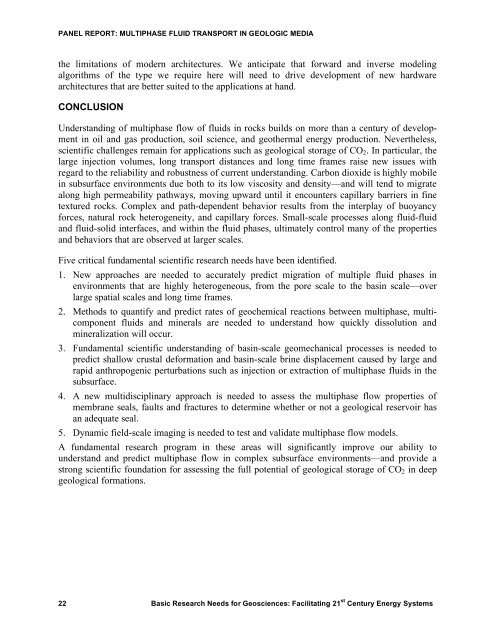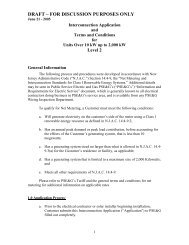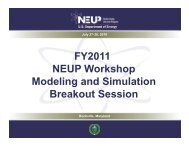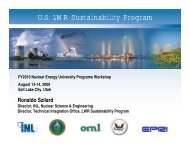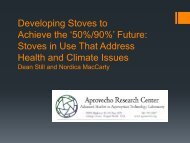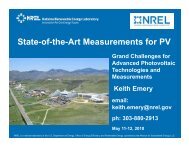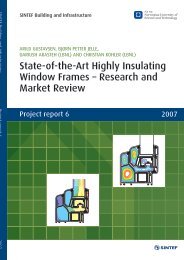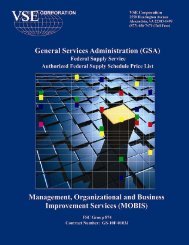Basic Research Needs for Geosciences - Energetics Meetings and ...
Basic Research Needs for Geosciences - Energetics Meetings and ...
Basic Research Needs for Geosciences - Energetics Meetings and ...
- No tags were found...
You also want an ePaper? Increase the reach of your titles
YUMPU automatically turns print PDFs into web optimized ePapers that Google loves.
PANEL REPORT: MULTIPHASE FLUID TRANSPORT IN GEOLOGIC MEDIAthe limitations of modern architectures. We anticipate that <strong>for</strong>ward <strong>and</strong> inverse modelingalgorithms of the type we require here will need to drive development of new hardwarearchitectures that are better suited to the applications at h<strong>and</strong>.CONCLUSIONUnderst<strong>and</strong>ing of multiphase flow of fluids in rocks builds on more than a century of developmentin oil <strong>and</strong> gas production, soil science, <strong>and</strong> geothermal energy production. Nevertheless,scientific challenges remain <strong>for</strong> applications such as geological storage of CO 2 . In particular, thelarge injection volumes, long transport distances <strong>and</strong> long time frames raise new issues withregard to the reliability <strong>and</strong> robustness of current underst<strong>and</strong>ing. Carbon dioxide is highly mobilein subsurface environments due both to its low viscosity <strong>and</strong> density—<strong>and</strong> will tend to migratealong high permeability pathways, moving upward until it encounters capillary barriers in finetextured rocks. Complex <strong>and</strong> path-dependent behavior results from the interplay of buoyancy<strong>for</strong>ces, natural rock heterogeneity, <strong>and</strong> capillary <strong>for</strong>ces. Small-scale processes along fluid-fluid<strong>and</strong> fluid-solid interfaces, <strong>and</strong> within the fluid phases, ultimately control many of the properties<strong>and</strong> behaviors that are observed at larger scales.Five critical fundamental scientific research needs have been identified.1. New approaches are needed to accurately predict migration of multiple fluid phases inenvironments that are highly heterogeneous, from the pore scale to the basin scale—overlarge spatial scales <strong>and</strong> long time frames.2. Methods to quantify <strong>and</strong> predict rates of geochemical reactions between multiphase, multicomponentfluids <strong>and</strong> minerals are needed to underst<strong>and</strong> how quickly dissolution <strong>and</strong>mineralization will occur.3. Fundamental scientific underst<strong>and</strong>ing of basin-scale geomechanical processes is needed topredict shallow crustal de<strong>for</strong>mation <strong>and</strong> basin-scale brine displacement caused by large <strong>and</strong>rapid anthropogenic perturbations such as injection or extraction of multiphase fluids in thesubsurface.4. A new multidisciplinary approach is needed to assess the multiphase flow properties ofmembrane seals, faults <strong>and</strong> fractures to determine whether or not a geological reservoir hasan adequate seal.5. Dynamic field-scale imaging is needed to test <strong>and</strong> validate multiphase flow models.A fundamental research program in these areas will significantly improve our ability tounderst<strong>and</strong> <strong>and</strong> predict multiphase flow in complex subsurface environments—<strong>and</strong> provide astrong scientific foundation <strong>for</strong> assessing the full potential of geological storage of CO 2 in deepgeological <strong>for</strong>mations.22 <strong>Basic</strong> <strong>Research</strong> <strong>Needs</strong> <strong>for</strong> <strong>Geosciences</strong>: Facilitating 21 st Century Energy Systems


